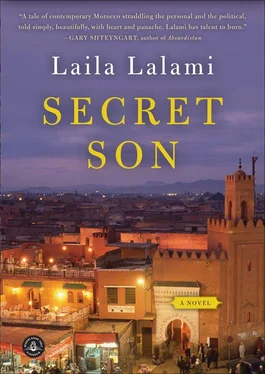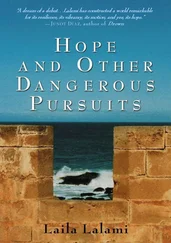Then there was the Berber Student Alliance, which usually met outside the doors of the amphitheater. They had organized several successful conferences on Amazigh history and culture. Now they wanted to have a department of their own. The university already had departments of Arabic, French, English, Spanish, and German, so why, the Berber Student Alliance demanded, did it not have one for Tamazight? This was discrimination, they argued, part of a long-standing pattern in this country. After a sociology professor gave a lecture in which he said that the vast majority of Moroccans were racially mixed, the Berber pride students began to wear T-shirts emblazoned with Tifinagh characters.
The Saharawi students often gathered by the coffee machines. They had put up a banner in support of the independence of the Saharan territories, but other students savagely tore it down, called them “traitors to the national cause,” and told them that if they did not like Morocco, they should go study at one of the Polisario Front’s camps. The fights got physical; the police were called in. But they stood by while the students fought. Now the Saharawi students were talking about organizing a sit-in outside the administration building.
Then there were the three undercover cops, whom Youssef had mentally nicknamed the Three Basris. They often chatted with the uniformed police guards outside the lecture halls and had therefore blown their cover, but they did not appear to care. Perhaps that was the point: they wanted people to know they were there because it was easier to intimidate people this way. One of them was on his second bachelor’s degree — he already had one in history — but the other two were much younger.
Every time Youssef tried to penetrate one of these cliques, he felt he was lacking some background, some essential element that would make it easier to know what to say, when to say it, and how to say it. He went inside the classroom and sat alone by the window.
DR. SABRI WALKED into class fifteen minutes late. He was young, in his late twenties maybe, and he casually leaned against the side of his desk when he spoke. “I’m sorry I’m late, guys,” he said. He took his copy of The Great Gatsby out of his briefcase and, in an accent that, to Youssef’s ears, sounded perfectly American, asked, “I assume you’ve all read the book, as I’ve requested?”
A few people nodded, while others looked studiously down at their notebooks, avoiding his gaze.
“Very well, then.” He opened the book to the first page and read, his voice a deep baritone. “In my younger and more vulnerable years my father gave me some advice that I’ve been turning over in my mind ever since. ‘Whenever you feel like criticizing any one,’ he told me, ‘just remember that all the people in this world haven’t had the advantages that you’ve had .’ ” He looked up and smiled. “Ah, good old Nick!” Dr. Sabri spoke this way throughout the lecture, referring not just to the characters, but to the author as well, by their first names, as though he knew them.
Majoring in English had its advantages — homework consisted of reading novels (imagine that!) — so Youssef was pleased with the choice he had made. And The Great Gatsby afforded him a special treat: imagining himself in Robert Redford’s role. He had seen the film adaptation at the Star Cinema, and when he had read the novel before class, he had found it impossible to picture a face for Jay Gatsby other than the one he already had in mind.
As the first hour drew to a close, Dr. Sabri asked, “And what of Daisy?” He looked around the room, waiting for opinions. The class was silent, united in its refusal to meet his eye. “Okay, so who is she?” he asked.
“A woman from the upper class,” said a blond, curly-haired boy in the front row, his intonation rising, waiting for approval.
“Clearly, she is. But what else?” asked Dr. Sabri.
“Daisy is a lost woman,” one of the bearded boys shot back.
“Hmm. I suppose it depends what you mean by ‘lost.’ What do you mean?”
“She spends time with another man, even though she is married.”
“I hope you’re not serious, man. If that were the definition of ‘lost,’ then half the women in this country would qualify.”
The young man leaned forward on his desk, dropped his chin in his hand, and stared defiantly. “That’s the problem.”
Dr. Sabri looked away uncomfortably. “Okay, anyone else?”
Youssef raised his hand, and the professor looked at him encouragingly. “She is the dream — Gatsby’s dream.” A girl in the front row laughed out loud at his answer and turned to stare mockingly at him. Her skin was fair, her eyes playful, and her features delicate, like those of a miniature painting.
“That’s a lovely answer, actually,” Dr. Sabri said, looking appreciatively at him. “Let’s see if we can figure out whether the book bears it out.”
The girl pouted and turned around to face the blackboard.
AFTER THE LECTURE, Youssef came out into the corridor to find her waiting for him. She wore a green top that matched her jade earrings, and carried her mobile phone in her hand. “Je suis désolée, ” she said. “I didn’t think that Dr. Sabri was looking for that answer.” She laughed easily, touching Youssef on the arm as she did so.
“Not a problem,” he replied. He felt a surge of gratitude to his mother, because without her tutoring, his diction in French would not have been flawless. To listen to him, one would never have known he lived in Hay An Najat. The girl ran her fingers through her hair in a consciously flirtatious way. He was encouraged. “What’s your name?”
“Alia,” she said. “And you?”
“Youssef.”
“ Salut,” she said, flashing a smile that displayed perfectly aligned teeth.
“Have you seen the movie, the one based on the book?”
“Of course.” She winked at him. “I haven’t read the novel.”
“Really?”
“What for? It’s no different than the movie.”
One of the Mercedes-and-Marlboros called her, and so, waving good-bye, she turned on her heel and walked away, leaving a trail of perfume behind her. Even though she had been rude, her apology made him feel he had judged her too quickly. He watched her as she caught up with the other Mercedes-and-Marlboros, all the while wondering if he would ever be able to be part of her group.

The truth came out, Youssef would later recall, as a result of a simple football game. The Partisans had cleared a dirt lot of the trash that was regularly dumped in it, planted white poles and goal nets, and turned it into a football field for the young men of Hay An Najat. One Saturday afternoon, Maati bought a new ball at Derb Ghallef, and he, Youssef, and Amin went to try it out. When they arrived at the field, they found a group of boys already playing, using a torn ball stuffed with fabric. No one knew or recognized them.
“Should we come back later?” Youssef asked, looking around to his friends. Mounir, Rachid, and Simo had come along to play, too.
Without answering, Maati walked onto the lot, interrupting the game. “This is our football field,” he said.
One of the intruders, a tall boy with a dirty white shirt and frighteningly thick eyebrows, walked up to Maati. “I don’t see your father’s name anywhere on it,” he said. His teammates laughed, their ha-has overlapping. They came to stand behind their friend, arms akimbo.
Youssef spoke up. “We play here on Saturdays and Sundays, and we’ve never seen you before.”
“So what?” Eyebrows opened his right palm, as though he were waiting for a better explanation. He seemed to be the leader.
Читать дальше













